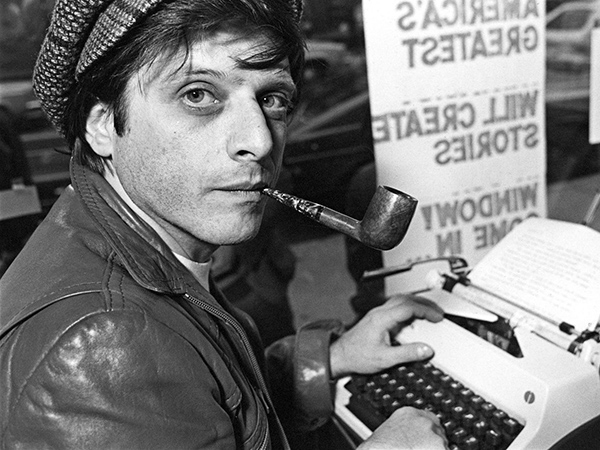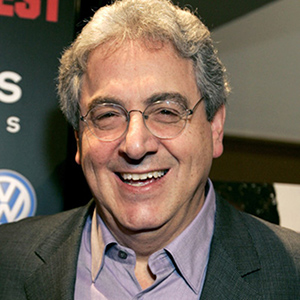I am pleased to announce that my filmed version of the play Eliot Ness: An Untouchable Life is now available in HD on Amazon Prime, and included as part of your membership. Here’s a link so you can watch it at your leisure, and I hope you take time to give it a nice rating (as in five star). [Note from Nate: For non-Prime members, rental is $2.99 and you can own the digital HD for $9.99]

As you may recall, the film is a one-man show with my late friend Michael Cornelison bringing Ness back to life. It was made possible by a grant from Humanities Iowa, several airings by Iowa PBS, and a lot of hard work by my buddy Phil Dingeldein and myself (and many others).
This is very gratifying, and of course is the work that led directly to the current non-fiction book, Scarface and the Untouchable: Al Capone, Eliot Ness, & the Battle for Chicago by A. Brad Schwartz and me.

Coincidentally, I got this news while I was in Las Vegas with Brad making two appearances in support of our book at the Mob Museum. The museum itself is a terrific facility, and those who run it are outstanding. I was blown away by how much of what is on display relates to various things I’ve written, from Dick Tracy to the Nathan Heller saga and the four Eliot Ness in Cleveland novels. A wall of photos and descriptions of organized crime killings was virtually a greatest hits of my literary output (Willie Bioff, Mad Sam Destefano, etc.). I will include some highlights by way of photos, including my co-author and me in front of the actual St. Valentine’s Day Massacre wall as well as with the real machine guns used in that, uh, celebration. More photos may follow.
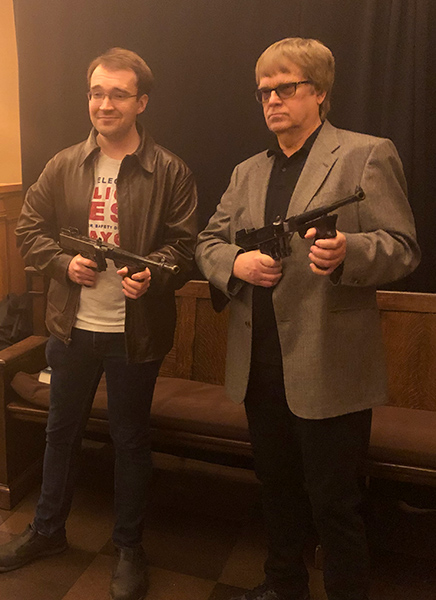
Because our appearance was in conjunction with the 90th anniversary of the massacre, and the seventh anniversary of the Mob Museum opening, the attendance reached record proportions. Both of our appearances were well-attended, as were book signings in the Mob Museum gift shop.
What’s interesting to me is how attitudes in Vegas have shifted on the mob influence that built the modern “sin city.” Back in the ‘80s, researching Neon Mirage – the Nate Heller novel about Ben “Bugsy” Siegel and Vegas – I encountered some resistance to my research into what was then seen by many as an embarrassing aspect of local history. That has definitely changed, as Vegas embraces its colorful past.
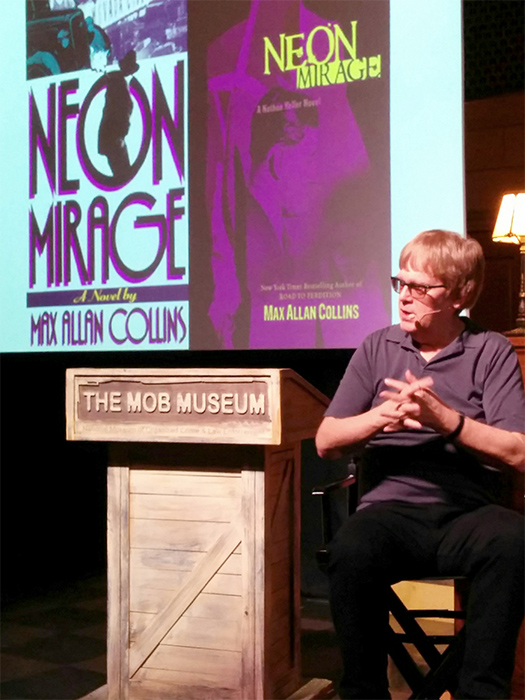
Brad did an excellent job, utilizing power point presentations (Baby Boomers – that’s “slide show” to you) and I was frankly not at my best at the first presentation, very tired from travel and a long day. The subsequent presentation, however, found me back on my game and Brad just as good as before. If we get a link to the video of it that the Museum made, I’ll provide it in the next few weeks.
Interestingly, nobody asked me a single question about CSI, which of course was set in Vegas, with my five years as its licensing writer (novels, video games, jigsaw puzzles, graphic novels, often with Matt Clemens) not rating a single inquiry. CSI seems to have retreated into the past, at least the Las Vegas past.
All in all, it was a great trip, and there’s a reasonable possibility we’ll be asked back next year to talk about The Untouchable and the Butcher (the sequel to Scarface and the Untouchable, currently in progress) and the new Nate Heller (Do No Harm, the Sam Sheppard murder case, due out in about a year).
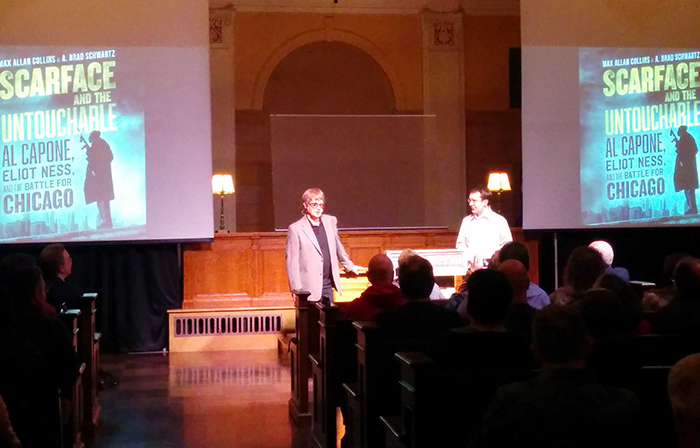
My fellow classmates at Muscatine High School will be saddened to learn of the death of Steve Kochneff, a beloved figure in our collective past and one of my best friends from those years. As had been the case with Jon McCrea (who became the partial basis for Quarry), Steve was someone I stayed in touch with over the years. He spent much of his life in L.A., pursuing the Hollywood dream, and he and I and Barb often got together there, to catch up, meeting usually at the great deli restaurant, Cantor’s.
At MHS, Steve was a genial madman, an eccentric with a unique comic wit, very popular and known for his creativity and his athletic ability. His father had been a much-loved and successful basketball coach, and Steve – who was tall and lanky – was a center on our MHS team, and excelled in that role.
But Steve also was known for mounting crazy comic skits. He and I were collaborators on these. He would come to my house and we’d hole up in my room with me at the typewriter and Steve pacing and throwing around ideas. This was very much like the old Hollywood cliche, short only of Steve puffing on a cigar. At the height of the James Bond craze, we did a Goldfinger take-off skit at a pep rally about a villain called Purple-and-Gold-Finger (purple and gold being our school colors – why the villain bore the school colors is lost to history and my fading memory). The kids loved it.
I was always a little jealous of Steve’s popularity around the school, since we were collaborators and he got the credit, or anyway the love. I was too intense and needy, and Steve was just a big guy with a great laugh and a wide smile, and all that love came pouring in, unbidden. As with so many high school stars, those days were probably the best of his life. In years to come he would be jealous, in a very sweet and even supportive way, of the success I’d achieved in the arts, staying home in Iowa when he had made the Hollywood trek.
I have talked about how I wrote novels in high school and tried to sell them – writing all summer, marketing all year (unsuccessfully), and my career is based on that enthusiastic early obsessive behavior. Only Steve Kochneff was capable of topping me. He wrote a Laugh-In script a year or so after graduation and drove out to Hollywood to deliver it. My memory is fuzzy on this, but I believe he eventually did do some work on the show.
Over the years he had a lot of projects and many were interesting, and I believe some were stolen from him. He created potential shows, with scripts, for a comedy about female wrestlers, a cop show about a motorcycle-riding Hispanic female detective, and an ambitious film script about a cloning of Princess Diana. And much more. His biggest success, perhaps, was his pioneering production company shooting videos of high-ticket homes in Beverly Hills, Bel Air and other exclusive sections.
We talked a number of times about collaborating, and I offered several times to get involved with projects. But he always preferred to go his own way – to talk to me and get input, but make his own mark. Like many talented people in Hollywood, he came close. So close.
He came back to Muscatine from time to time and stayed with us at least once that I can recall. I know he envied my luck in having Barbara as a wife, so beautiful, so supportive, so talented herself. He knew I had really struck gold there, that this was an element that he wished he had in his life. I know he had close relationships with various women in Southern California and also, I think, in Arizona. But he never shared details with me.
I had a phone call from him a few months ago and it was a warm exchange, as always. I gave him a bad time for not coming to the MHS 50th class reunion, and he revealed to me that he was embarrassed to attend. He thought we all knew that he’d gone to prison for a while, apparently on a trumped-up, non-violent charge. But we hadn’t heard, and when he told me – rather haltingly – I said I was in the friendship business, not the judgement one. Typically, he was full of enthusiasm to write a movie script or TV pilot based on his experiences inside. Like any real writer would, Steve viewed incarceration primarily as an opportunity to do research.
Listen, I loved the guy. It broke my heart to learn he had died January 2 in a psychiatric hospital. But I am relieved that his search for fame and success is finally over, because I suspect as the years passed that effort grew only more frustrating and finally painful. I want to assure you that our phone conversation, perhaps two months before he passed, was filled with laughter.
I can hear that laugh right now. One of those distinctive laughs, a combination of glee and embarrassment.
He signed himself Starko, and I didn’t even get into what a terrific artist – in particular cartoonist – he was.
So long, Steve. Damnit. So long.
Yes, it’s yet another “Films You Didn’t Know Came from Comic Books” write-up in which Road to Perdition is included.
M.A.C.
